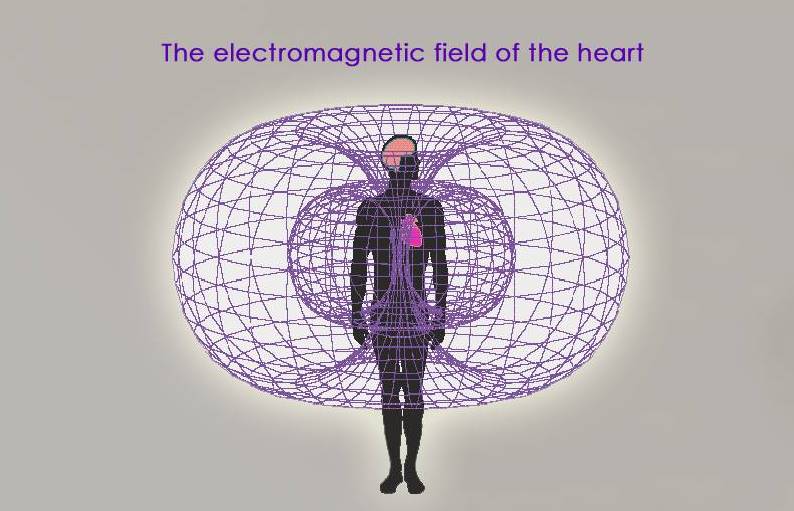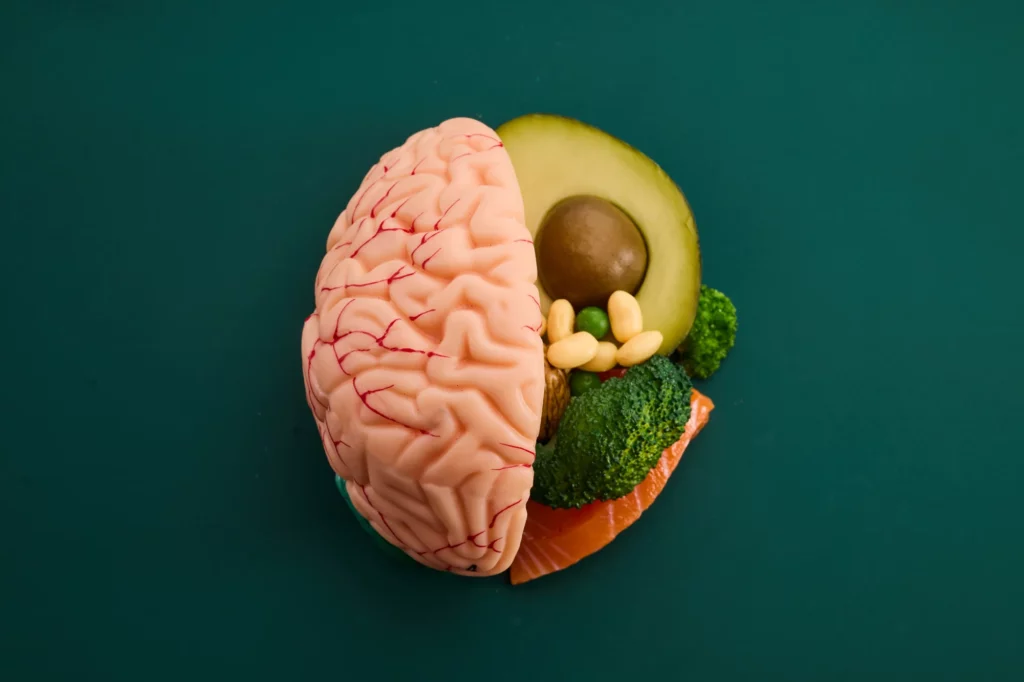The body’s electromagnetic field is generated by its electrical activity, mainly by the rhythm of the heart (measurable by ECG) and the signals of the brain (by EEG). These fields are created by ionic flows in nerve and muscle cells, while the magnetic field is formed by electric currents according to the laws of electromagnetism. Researchers use methods such as magnetocardiograms (MCG) to analyze the heart’s magnetic signals and magnetoencephalograms (MEG) for brain activity[1].
With Metatron bioresonance, it is possible to analyze how diet and nutrition affect the body’s electromagnetic fields. Studies show that these fields are dynamic and react to internal and external factors, including what we eat, making this topic both fascinating and complex.
How diet controls the electrical activity of the heart
The electrical activity of the heart requires electrolytes such as potassium, sodium, calcium and magnesium to function optimally. Potassium deficiency, for example, causes irregular heartbeats, which are clearly visible on an ECG[2].
Food and the heartbeat
Meals increase heart rate and moderately alter heart waves according to the ECG, although the effect varies with the size and content of the meal[3].
- Large meals that are high in carbohydrates, fat or salt affect the workload of the heart more than small snacks. Initially, the heart rate may increase slightly to pump more blood to the stomach and intestines. As digestion progresses, the parasympathetic nervous system is activated, usually leading to a decrease in heart rate.
- Fast carbohydrates can cause a rapid insulin surge, sometimes activating the sympathetic nervous system and raising the heart rate.
- High-fat meals have a longer-lasting effect because the fat is broken down over several hours.
- High salt intake can affect ECG values for cardiac stress in both normal and hypertensive people. [4, 5]
- Too much calcium alters heart function and can affect the rhythm of the heartbeat[2].
As the heart’s electrical currents create a weak magnetic field around the body, diet can influence this indirectly. For example, magnetocardiograms (MCGs) are used to analyze the relationship between the heart’s electromagnetic signals and body processes
The heart’s magnetic field plays an important role in metabolism, insulin regulation and blood sugar balance through its impact on the autonomic nervous system. Studies show that heart rate variability (HRV) is linked to metabolism and insulin regulation. A high HRV is associated with better blood sugar balance and reduced risk of type 2 diabetes, while a low HRV can impair metabolism.
Cardiac coherence training and breathing exercises can therefore contribute to stable blood glucose levels and better energy metabolism.
External static magnetic fields have been shown to affect iron metabolism and oxidative stress, and there are indications that cardiac biomagnetic fields may interact with these effects[6]. Research on the electromagnetic influence of the heart on metabolism is still evolving.
How diet shapes brain electrical activity
What we eat affects the brain’s electrical and biomagnetic fields – both within neurons and in the energy field surrounding the body. A nutritious diet can strengthen the brain’s electromagnetic stability by improving neuronal communication and synchronizing brain waves(10).
Ketogenic diet and the brain’s electrical balance
A ketogenic diet (high fat, very low carbohydrate) has been shown to stabilize the electrical activity of the brain and is successfully used in the treatment of epilepsy.[7]. It can also:
- Provide neurons with stable fuel , which stabilizes the brain’s electrical activity and counteracts the disturbances caused by aging and neurodegenerative diseases(8)
- Improve cognition in neurodegenerative diseases by synchronizing brain waves(9)
- Increase BDNF production, an important growth factor in the brain. BDNF optimizes the function of neurons, synchronizes brain waves and strengthens the connections in the brain’s electrical network.
Nutrients that support the electrical function of the brain
- Omega-3 fats, especially DHA, strengthen nerve cell membranes and improve signal transmission, which can lead to smoother brain activity.
- Antioxidants such as flavonoids and polyphenols protect against oxidative stress and help stabilize the brain’s electrical signals.
- B vitamins and folate support energy production in nerve cells, which can reduce brainwave oscillations and improve cognition.
At the same time, inflammatory foods and nutritional deficiencies can disrupt the brain’s electrical balance and reduce the coherence of the electromagnetic field.
Your state of mind affects brain waves during meals
Your mental state during meals plays a crucial role in both the brain’s electrical activity and the body’s nutrient absorption. Stress impairs digestion by reducing blood flow to the gastrointestinal tract, which can disrupt nutrient absorption and gut flora.
EEG studies show that stress lowers alpha waves and increases beta waves, which can create imbalances in the autonomic nervous system and affect the production of key neurotransmitters.
In contrast, a relaxed and positive state of mind can increase alpha waves and stimulate the release of oxytocin, a hormone that not only promotes social well-being and stress reduction, but also improves digestion and optimizes nutrient absorption. By eating in a calm and harmonious environment, you can promote better gut health, more stable brain waves and increased well-being(11).
The role of nutrition in the body’s electrical network
A balanced diet with essential nutrients is crucial for the body’s electrical functions, including nerve signaling, muscle activity and metabolism.
Electrolytes such as sodium, potassium, calcium and magnesium help stabilize the electrical charge of cells and enable effective nerve communication.
Omega-3 fatty acids, especially DHA, support brain function by improving synaptic transmission, while vitamin B12 plays a key role in nerve impulses by supporting myelin formation.
Iron is essential for oxygen transport and energy production in the mitochondria, affecting both brain activity and muscle performance.
A diet rich in these nutrients, including foods such as oily fish, leafy vegetables, dairy products, legumes and nuts, can contribute to better cognition, more stable brain activity and optimal nerve function.

Discussion on “electrical food”
Some integrative medicine theories suggest that so-called ‘electric foods’ – often raw, organic foods such as fruit, vegetables and nuts – can strengthen or balance the body’s electromagnetic field. That these foods have a unique energy charge or vibration that can be measured, for example using techniques such as Kirlian photography, which captures electrical discharges around objects.
This holistic approach links diet to the body’s bioelectrical balance, and many people experience subjective health benefits from eating more natural, nutrient-dense and unrefined foods. According to the same theories, processed foods, sugars and highly refined foods can have a negative effect by disrupting the body’s frequency and creating imbalances in the electromagnetic field.
Although many advocates of integrative medicine believe that food has a measurable energy impact, there is still a lack of strong scientific evidence to confirm this. Rather, traditional medicine suggests that electromagnetic fields in the body are governed by biological processes, such as ion flow, nerve signaling and cell communication, rather than specific energy from individual foods.
Research into frequency medicine and electromagnetic fields is still evolving, and future studies will hopefully provide a deeper and more nuanced understanding of how diet, nutrition and energy fields interact. Although the theory of electric foods is controversial, it is a fascinating topic that is attracting interest in both integrative medicine and biohacking.
Bioresonance and electromagnetic fields in health assessment
Bioresonance is an integrative and frequency medicine technique that analyzes the body’s electromagnetic frequencies to identify potential imbalances in organs, tissues and cells. Metatron Hospital, an advanced bioresonance technology, is based on the principle that each biological system has a unique frequency signature that can be influenced by factors such as nutrition, metabolism and environmental influences.
This method is used to map individual frequency patterns, identify nutritional deficiencies and analyze the body’s biophysical response. By measuring the body’s electromagnetic signals, the technique can theoretically help optimize diet and nutrient intake by recommending foods that harmonize with the body’s natural balance.
Research in biophysics and quantum medicine has shown that cell communication takes place partly via electromagnetic signals, opening the door to further studies on how the bioelectrical properties of food affect health.
Although scientific research in bioresonance is still limited, there is growing interest in how advanced frequency analysis can be integrated with conventional nutritional medicine. Metatron Hospital and similar technologies can provide a deeper understanding of the interaction between nutrition, the body’s electromagnetic fields and metabolic processes.
At the Neoclinic, we see this as a valuable complement to established nutrition principles, combining frequency-based health assessment with individualized dietary recommendations to optimize well-being and energy balance.
References
- Biomagnetism: The First Sixty Years
- AI in ECG-Based Electrolyte Imbalance Prediction: A Systematic Review and Meta Analysis
- Influence of food intake on electrocardiograms of healthy male volunteers, European Journal of Clinical Pharmacology
- Influence of dietary sodium modulation on electrocardiographic voltage criteria for left ventricular hypertrophy in normotensive individuals
- Dietary sodium alters the prevalence of electrocardiogram determined left ventricular hypertrophy in hypertension
- A Static Magnetic Field Improves Iron Metabolism and Prevents High-Fat-Diet/Streptozocin-Induced Diabetes
- Influence of the Ketogenic Diet on 24-Hour Electroencephalogram in Children With Epilepsy, ScienceDirect
- Ketosis regulates K+ionchannels, strengthening brain-wide signaling disrupted by age
- The Effect of the Ketogenic Diet on the Therapy of Neurodegenerative Diseases and Its Impact on Improving Cognitive Functions
- Brain foods: the effects of nutrients on brain function
- A novel role of oxytocin: Oxytocin-induced well-being in humans






